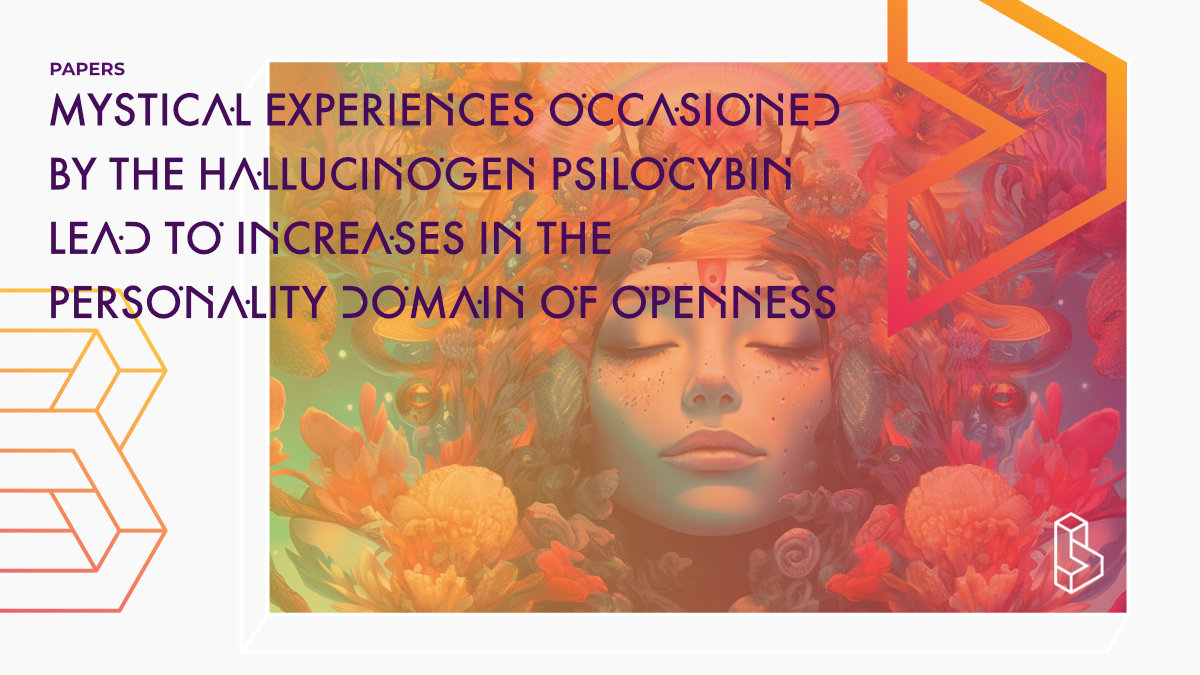This re-analysis from two psilocybin trials with hallucinogen-naïve subjects (n=52) looked at personality changes in participants. It found significant increases in openness (but not neuroticism, extroversion, agreeableness, and conscientiousness), which remained higher than baseline for those who had a mystical experience up to a year.
Abstract of Mystical experiences occasioned by psilocybin lead to increases in openness
“A large body of evidence, including longitudinal analyses of personality change, suggests that core personality traits are predominantly stable after age 30. To our knowledge, no study has demonstrated changes in personality in healthy adults after an experimentally manipulated discrete event. Intriguingly, double-blind controlled studies have shown that the classic hallucinogen psilocybin occasions personally and spiritually significant mystical experiences that predict long-term changes in behaviors, attitudes and values. In the present report we assessed the effect of psilocybin on changes in the five broad domains of personality – Neuroticism, Extroversion, Openness, Agreeableness, and Conscientiousness. Consistent with participant claims of hallucinogen-occasioned increases in aesthetic appreciation, imagination, and creativity, we found significant increases in Openness following a high-dose psilocybin session. In participants who had mystical experiences during their psilocybin session, Openness remained significantly higher than baseline more than one year after the session. The findings suggest a specific role for psilocybin and mystical-type experiences in adult personality change.”
Authors: Katherine A. MacLean, Matthew W. Johnson & Roland R. Griffiths
Summary of Mystical experiences occasioned by psilocybin lead to increases in openness
Psilocybin and other classic hallucinogens produce unique subjective effects, including changes in perception, cognition, affect, volition, and somaesthesia. These effects include a greater appreciation of music, art, and nature, greater tolerance of others, and increased creativity and imagination.
Hallucinogens may have long-term positive effects by occasioning profound insights and mystical-type experiences. These experiences may change core dimensions of personality, but the impact of psilocybin-occasioned mystical experiences on core personality traits is unknown.
Further Notes
This study worked with the same participant data as Griffiths et al. (2016) and Griffiths et al. (2011).
The same result about openness is also found in a 10-person study by Madsen et al (2020) and a 20-person study by Carhart-Harris et al (2016).
Noted should be that the effect size (mean change = +2.8 on an average of 63 points) is relatively small.
Find this paper
https://doi.org/10.1177/0269881111420188
Open Access | Google Scholar | Backup | 🕊
Cite this paper (APA)
MacLean, K. A., Johnson, M. W., & Griffiths, R. R. (2011). Mystical experiences occasioned by the hallucinogen psilocybin lead to increases in the personality domain of openness. Journal of psychopharmacology, 25(11), 1453-1461.
Study details
Compounds studied
Psilocybin
Topics studied
Personality
Healthy Subjects
Study characteristics
Original Re-analysis
Placebo-Controlled
Double-Blind
Randomized
Follow-up
Participants
52
Humans
Authors
Authors associated with this publication with profiles on Blossom
Roland GriffithsRoland R. Griffiths is one of the strongest voices in psychedelics research. With over 400 journal articles under his belt and as one of the first researchers in the psychedelics renaissance, he has been a vital part of the research community.
Matthew Johnson
Matthew Johnson is an Associate Professor of Psychiatry and Behavioral Sciences at Johns Hopkins University. His research is concerned with addiction medicine, drug abuse, and drug dependence.
Institutes
Institutes associated with this publication
Johns Hopkins UniversityJohns Hopkins University (Medicine) is host to the Center for Psychedelic and Consciousness Research, which is one of the leading research institutes into psychedelics. The center is led by Roland Griffiths and Matthew Johnson.
Compound Details
The psychedelics given at which dose and how many times
Psilocybin 30 mg | 4xLinked Research Papers
Notable research papers that build on or are influenced by this paper
Psilocybin can occasion mystical-type experiences having substantial and sustained personal meaning and spiritual significanceThis is one of the first (and key) double-blind, placebo-controlled studies (n=36) on psilocybin and its effect on 'healthy normals'. It shows that a high (30mg/70kg) dose can occasion mystical (peak) experiences (participants did already have a spiritual/religious practice beforehand). The experience is rated as personally meaningful. The participants exhibit positive mood (and lower anxiety) immediately and after two months.
Psilocybin occasioned mystical-type experiences: immediate and persisting dose-related effects
This double-blind, randomized study (n=18) investigated the effects of psilocybin at different dosages. It found that positive effects were most pronounced at 20/30mg per 70kg. At two and 14 months later, participants indicated positive changes and rated the experience as one of the top 5 life experiences.

